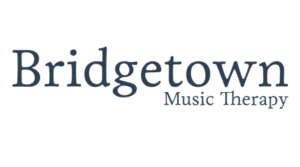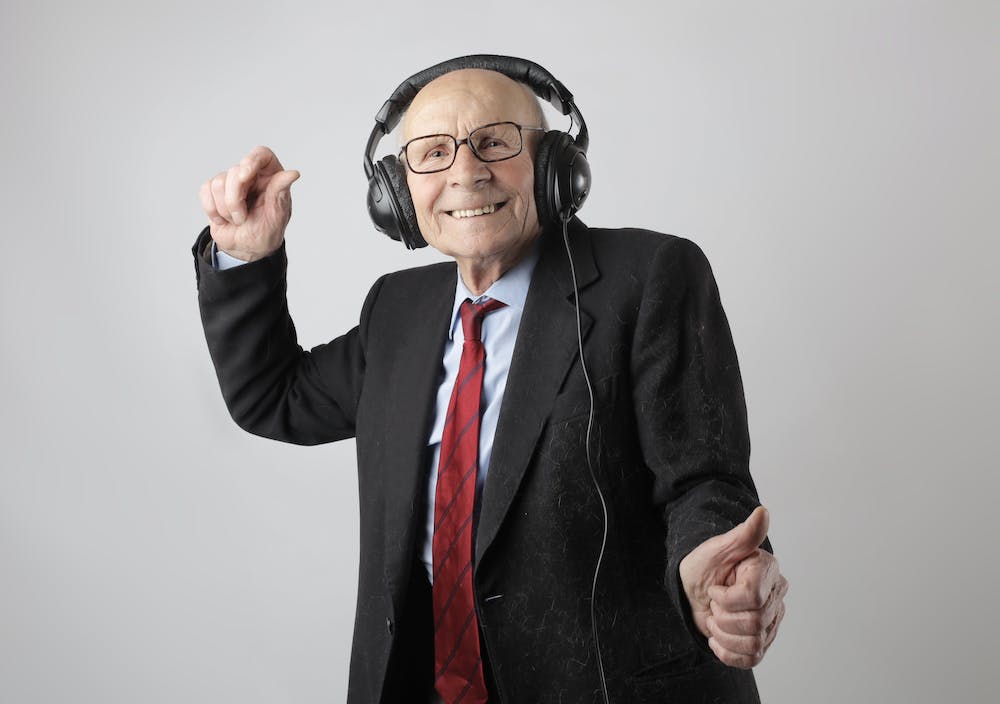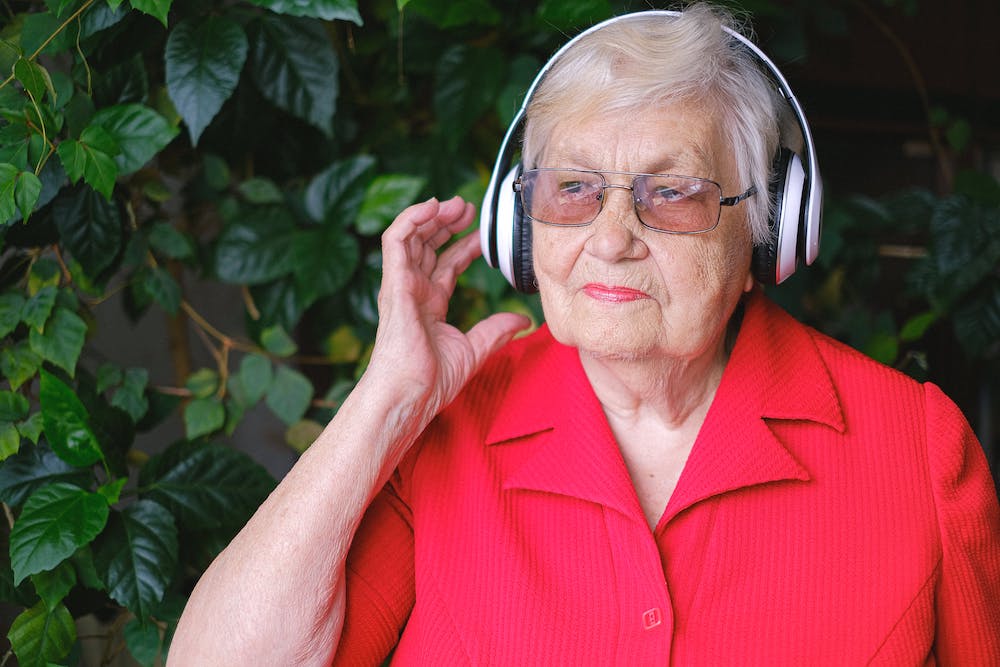Your Questions Answered About Music Therapy and Dementia
 Submitted by Alexis Baker, MT-BC, CDP
Submitted by Alexis Baker, MT-BC, CDP
Founder, Owner & Music Therapist
Bridgetown Music Therapy
What are the benefits of music therapy for dementia?
The benefits of music therapy are abundant and far-reaching such as: improved mood, decreased agitation, reduced anxiety, stress relief, increased self-expression, enhanced cognition & memory, opportunity for fun, relaxation and enjoyment, improved communication and social connection, and increased physical movement. By addressing various physical, cognitive, social, emotional and spiritual dimensions of being, music therapy can support overall quality of life.
While music therapy can offer numerous physiological and mental benefits, it’s important to note that it’s not a cure for dementia. However, it can be a valuable intervention or complementary approach to conventional treatments, enriching the lives of those affected by the condition. Specific benefits and responses experienced vary from person to person.
How might someone living with dementia respond to music therapy?
Music therapy can have a significant and positive impact on people living with dementia. The brain’s response to music is complex, and even in the most advanced stage of dementia, people may still retain the ability to respond to and connect with music.
People living with dementia may respond to music therapy in a myriad of ways. Here are just a few potential ways a person living with dementia might respond to music therapy:
- Emotional expression
- Physical movement
- Singing
- Social interaction
Many respond by engaging with the world around them when they may typically present as withdrawn. Responses can occur when verbally prompted, such as when the therapist asks, “Will you help me sing this song?” They may be prompted by nonverbal cues such as the rhythmic nature of the music motivating a person to tap their toe, dance to the beat or move their body in some way to the music.
When an individual loses the ability to speak due to dementia, sometimes they are still able to sing, which makes music a powerful tool in supporting communication and connection. Music can help a person living with dementia engage with their loved one when it may have previously been a challenge.
Because of the way music affects the brain, it can often lead to what is called “moments of lucidity,” where the person living with dementia experiences clarity, such as suddenly remembering who their loved one is. In my work as a music therapist serving those living with dementia, I’ve witnessed all kinds of responses to music.
My favorite is the joy and laughter music can bring!

Why is music therapy especially beneficial in the late stages of dementia?
Due to the degenerative nature of dementia, when a person is in the later stages, their bodily functions have begun to shut down. They may be unable to actively participate in music interventions, but they most likely can still receptively engage in music therapy.
In end-of-life care, it’s generally understood that the last sense to go is hearing, so music can be effective to calm and comfort, as well as provide opportunity for connection with loved ones. Here are some additional ways music therapy is beneficial in later stages of dementia:
Non-verbal communication
Even in the late stages of dementia, some musical memories may remain intact. Familiar songs from the individual’s past can trigger memories and associations, providing a sense of comfort and familiarity.
Memory and recognition
As dementia progresses, verbal communication may become increasingly a challenge. Music, however, transcends language barriers and relies heavily on non-verbal communication, making it accessible and engaging for people with limited verbal abilities.
Emotional connection
Music has a unique ability to evoke strong emotional responses and memories in individuals, even in the advanced stages of dementia. It can reach parts of the brain that remain relatively intact, facilitating emotional connections and reducing feelings of isolation and agitation commonly experienced by those with late-stage dementia.

What are some examples of music activities that can be beneficial through each stage of dementia?
Music can function therapeutically in a myriad of ways, but the formal practice of music therapy is specific and limited. It is defined by the American Music Therapy Association as
“the clinical and evidence-based use of music interventions to accomplish individualized goals within a therapeutic relationship by a credentialed professional” (AMTA, 2023, musictherapy.org.)
Apart from formal music therapy services, there are many beneficial music-based activities within dementia care. If you are specifically looking to work with a music therapist, see the last question and answer below; otherwise, check out these ideas:
Early stage
Join a community or specialized dementia choir, attend concerts, play an instrument (keep it simple such as a hand drum, harmonica, or shake-able instrument), music therapy services, music listening and reminiscence, lyric discussion, a dementia-friendly music program such as that offered by Bridgetown Music Therapy
Mid stage
Join a community or specialized dementia choir, attend concerts, play an instrument (keep it simple such as a hand drum, harmonica, or shake-able instrument), music therapy services, music listening with personalized song playlist, movement to music, musical games such as “name that tune”, a dementia-friendly music program such as that offered by Bridgetown Music Therapy
Late stage
Singing or humming, play an instrument (keep it simple such as a hand drum, harmonica, or shake-able instrument), music therapy services, music listening with personalized song playlist, movement to music, a dementia-friendly music program such as that offered by Bridgetown Music Therapy
The key is to get creative and be willing to try many different types of music activities in order to find what work best for you and your care recipient. For additional ideas on incorporating music into the day-to-day of caring for your loved one, click here.
Note: We want to reserve the term “music therapy” for formal services. Some programs, services, and resources are created by or led by a music therapist but may still not be considered formal music therapy. We want to be careful about calling anything we see music therapy, while also recognizing the value and benefit of a variety of music-based activities that can also function therapeutically.
How can working with a certified music therapist (MT-BC) offer extra benefits?
Board-certified music therapists go through extensive training and can therefore offer a unique level of expertise. Music therapy program coursework not only covers the field of music, but also physiology, psychology and behavioral studies, as well as theory and practice of therapy. Music therapists complete 1,200 clinical hours and then must pass a board certification exam.
Recertification occurs every 5 years and requires 100 continuing music therapy education credits each cycle. Music therapy is a very passion-driven field, so a music therapist with board certification most likely got there because of a calling to the field and strong desire to help others using music.
Additionally, in working with a professional music therapist, they often can offer ideas and tips to the caregiver or care partner. They are yet another professional on your team to consult within the caregiving journey.
Where can a caregiver find music therapy services or resources?
A good place to start is the American Music Therapy Association (musictherapy.org) or the Certification Board for Music Therapists (cbmt.org), which both have a “Find a Therapist” tab where you can search by name, state, etc. to get in touch with a music therapist.
Next, many states have their own organization such as the Utah Association of Music Therapists (uamt.org) and often welcome inquiries.
Additionally, your local caregiver support group or organization may have information about music therapy services available in the community. Try asking them. Another option is to connect with music therapists via social media. Reach out, and they may be able to connect you to someone or the appropriate avenue.
Finally, many music therapists’ websites contain valuable information and resources regarding music therapy. You can always visit us at BridgetownMT.com and use the “Contact Us” button to reach out. We’re more than happy to help!
 Submitted by Alexis Baker, MT-BC, CDP
Submitted by Alexis Baker, MT-BC, CDP
Founder, Owner & Music Therapist
Bridgetown Music Therapy
Alexis Baker is a licensed and board-certified music therapist with 10 years professional experience. She has always loved older adults and is passionate about using music to make a difference in their lives, especially those living with dementia.
In 2017, Alexis founded Bridgetown Music Therapy with the mission to serve individuals and groups in dementia care by sparking joy and improving quality of life through meaningful music engagement!
